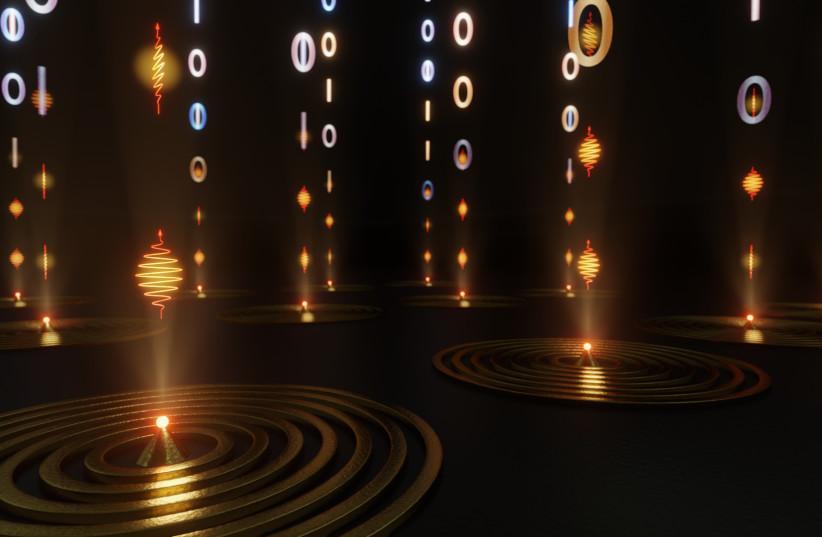Earlier this week, IonQ announced that it has produced a new quantum computer system called Aria which businesses can access via the Azure Quantum platform and which is more advanced than the earlier quantum system it had offered via Google Cloud and other platforms.
This came only weeks after IonQ announced a new division in Israel and in Germany, an announcement which came at the same time almost as the Israeli government was taking the next step forward in its push to build its own quantum computer along with private sector Israeli companies.
All of this is against the background in which an increasing number of countries and private sector companies – led by China and the US – are racing forward to try to be the first to dominate this new area of technology which could revolutionize military and economic affairs far beyond traditional advances in computing.
Experts in the field often say that today’s supercomputers will look like the stone age in comparison to the quantum paradigm shift which will replace them.
What was unique and also confusing about IonQ’s latest move was that its new announcement related to a 23 qubit computer – though it has had an operational 32 qubit computer for a couple of years.

The answer seems to be that the newest system has an algorithmic qubit (#AQ) count of 23, which could enable the quicker development of quantum simulations and algorithms. In layman’s terms, it is tailored more concretely to solving real-world problems, so the number of qubits may be deceiving.
It also is making quantum computing affordable to a wider number of customers, somewhat of a democratizing effect, which parallels the idea that Israel could develop its own quantum computer.
Until February, the government had been focused on quantum applications which it might use via the US and the foreign private sector and quantum sensor technologies, but had foregone trying to build its own quantum computer, due to the high cost and large variety of skills one must master to do so.
For example, Rafael was working with the ministry and the IDF on a variety of quantum sensor issues.
Then in February, the Israeli Defense Ministry’s Directorate of Research and Development (MAFAT) and the Innovation Authority announced they would invest around NIS 200 million toward building Israel’s first quantum computer.
A statement said that, “a quantum computation capability will provide the technological infrastructure for an Israeli eco-system which will be a leader in future developments in the security, economic, technological, engineering and scientific arenas.”
The statement said that the Defense Ministry would work on a longer-term basis to build all aspects of an Israeli quantum computer from the ground up, to ensure that Israel has its own home-grown capability.
A much larger budget and a longer-term sustained commitment, such as the newly allotted NIS 200 million, was required to dive into the more complex arena of quantum computing.
Innovation Authority Director Dror Bin said at the time that Israel “could not ignore” the capabilities, technology and industry the world is moving toward in quantum computing. “The industry must develop knowledge and access to infrastructure which will enable developing the engines of growth for activities in which it has a strong basis to be a leader.”
The Defense Ministry’s Directorate of Research and Development Director Dr. Danny Gold said, “Quantum computing, in all of its parameters, has been designated as an important component to the future security of the state and its technological supremacy,” versus its regional adversaries.
He said that the new moves were, “a substantial step forward toward building Israeli independence in this area.”
The Innovation Authority's plan for quantum
MOVING FORWARD with those plans from February, the Israel Innovation Authority announced, about one month ago, a budget of NIS 100 million to develop a quantum computing research center, managed by Israeli start-up Quantum Machines and using technology from Israeli start-up Classiq.
The center will work in parallel on three separate quantum processing technologies, including: superconducting qubits, cold ions and optic computer.
According to the Innovation Authority, it hopes to have a fully operational infrastructure within 12-18 months with over 50 qubits computing power in at least one of the three technologies.
MAFAT is still due to issue a tender for quantum technologies for military use to employ the other NIS 100 million of the designated budget.
Despite the high-minded goals, the rollout of the new programs has moved very gradually, it being unclear why the MAFAT part of the program has not yet fully moved forward.
Quantum is the state of things being unknown at the subatomic level until they can be observed and moves from the classic computer “byte” to the “qubit.”
In a quantum computer it is said that the values assigned to 0 and 1 can occur at the same time.
The reason this impossibility is possible is because of quantum’s subatomic level where protons and electrons are acting in a wild way beyond the rules of nature as we tend to think of them.
A more typical popular example would be the Avengers’ superhero Antman shrinking into the quantum zone where time did not even move in a linear fashion.
Superposition
In computer terms, once the values of 0 and 1 can happen at the same time, it allows the quantum computer to consider trillions of possibilities or more in the same instant, dwarfing the number of calculations that our traditional computers, stuck in binary counting, can do.
This process is called superposition.
Superposition ends once a specialized particle, or qubit, slows/is observable, thereby emerging from its quantum state.
We stick the qubit in an artificial “space vacuum” so that it does not get observed or interfered with and remains dynamic.
Pictures of quantum computers often show tubes the size of a household refrigerator. But most of the tubing is not the central computer processor as much as the process used to maintain the qubits at the absolute zero quantum state.
